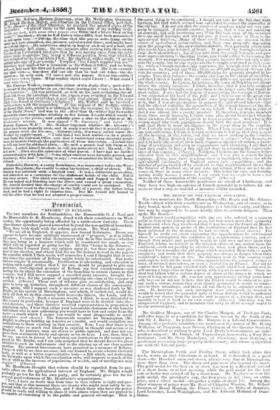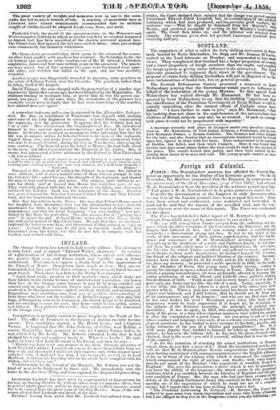MR. BEACH ON THE FRENCH SITUATION.
The two members for North Hampshire—Mr. Beach and Mn. Sdater- Bootb—dined with their constituents on Wednesday, and of course, as in duty bound, made speeches. Hampshire is a littoral county, and there- fore may be supposed to be more keenly alive to certain dangers. Thus spoke Mr. Beach--
Englishmen would sympathize with any one who suffered in a cause so Uoble as that of the liberty of the press, but how much must that sympathy be increased when they recollected that it was because the Count de Monta- lembert had spoken in praise of the institutions of England that he had been, subjected to the treatment he had received.. (Lund Mars.) For himself he could not avoid expressing the apprehensions he entertained when he contemplated the condition of a neighbouring country, and al- though they might, and probably would, be told over and over again that England, taking no interest in the internal affairs of any nation upon the continent, could not possibly be affected by what took place there, yet he could not but remember the old adage which reminded them with so much simplicity and truth that their property was always in danger alien their neighbour's house was on fire. No thinking man in this country could contemplate without the most serious apprehensions the prospect, sooner or later, of internal dissensions, or even a convulsion in France. Nor did he confess that he felt quite satisfied with the spirit which had manifested it- self among a large class in that country with regard to ouiselves. Some in- deed had talked with a certain degree of alarm of the danger in which we were of being invaded. He was not very apprehensive on that point him- self, because he did not ,believe that the French would he induced to pur- sue such a course, unless they were clearly persuaded it would be condu- cive to their advantage, and above all was likely to be attended with suc- cess. If, however, any such enterprise were attempted, lie trusted it would be found that the powerful navy of Great Britain would be sufficient to guard our shores from the insults and menaces of a foreign fleet, and speedily to beat it buck to, its own coasts. (Chcces.) The navy was the safeguard of .Li'ngland, and to maintain that navy- in all its strengh ought to be our national glory,.
Mr. Godfrey Morgan, son of Sir Charles Morgan, of Tredegar Park,
will offer himself as a candidate for Brecon, vacant by the death of the late Sir J. Bailey. In polities Mr. Morgan is a Liberal Conservative. Among other probable candidates are mentioned tho names of Mr. Henry Williams, of Penypont, near Brecon, Chairman of the Quarter Sessions, who is described as willing to give Lord Derby's Government an inde- pendent support ; Mr. Gough,' of Ynyseedwyn iron-works, a Tory Pro- tectionist; and Mr. Story Maskelyne, of Abersinny, near Defynog, a gentleman possessing large property in the county, and whose sympathies are with the Liberal party.
The Birmingham Cattle and Poultry Show, which took place this
week, warns us that Christmas is at hand. It is described as a good show—the Hereford oxen and steers, always very fine at Birmingham, were finer than ever. The sheep and pigs were also beyond the mark. The gold medal for the best ox or steer was won by a Hereford instead of a short horn, as at last meeting, while the gold medal for the best cow or heifer was carried off by a short-horn. Mr. Naylor's ox won the gold medal, the president's cup, the first prize in his class, an extra prize, and a silver medal—altogether a value of about 751. Among the other winners of prizes were Mr. Root of Chipping Warden, Mr. Robert Stratton of Broad Hunton, the Prince Consort, the Duke of Beaufort, Lord Leicester, Lord Waleingham, and Mr. Edward Holland of Dum- bkton.
goats vaiietyags weights end Measures . now ifl neon the eons, trades Itamiedseouituch alumna of late.. A meeting of 'mercantile men at Lissetrool louver tilmaet. unanimously recommended that an uniform weight nf 1001-bs shOuld'he adopted for all 'eorn; &air; and meal.
IftWderfols Cook, the guard Of the excursion-train on the Worcester and Wolverlianipton Itailivay to which so fearful and fatal an accident happened in-icilttguat lady hite,14en acquitted of the charges preferred against him. Thisfiressid.Jurv first ignored the bill -presented to them ; other proceedings were commenced, but inetantly withdrawn.
The'Crarne-laws are eontributing -their quota to the crimes of the senten.' Another fatal conflict with poachers has oCcurred. On Saturdnyitiebt, the six.ketiers and watchers in the employment of Mr. H. Akroyd, a Cheshire, nittgiatritte, discovered four men netting game in the preserves. The poach- era were seized; but at this moment two guns were discharged from oppo- aft* Odes; one Watther wiia killed on the spot, and one was Mortally
Minded.
Another keeper was dangerously we-ended in pursuing some poachers on the estate of Imtburn Tower, near the Cheviots. The poachers, rather than be taken, fired at the keepers.
David Thomas, the mameharged With the perpetration of a murder near Llandovery thirty-three years ag. o,Iiii.sbcen liberated by the Magistrates. No evidence tending to inculpate hire, or -prove that he was the person sup- posed, was givens At the same. time, the statenienta of the prisoner to a constable would seem to imply that he had some, knowledge Of the Murder, how derived does not appear., , A somewhat ludicrous Felice case is reported in the ../ireatiskire Iburepen- dent. Mr. Roe, an inhabitant of Winchester was charged with inciting somerrien of the 13th Regiment to mutiny.Colonel Home, commanding the. regiment, was the prosecutor. It appeal's that the Colonel had met 44 at, a stile" Miss Clearoland, the stepdaughter of Rec. He introduced himself to her, mitered upon a. correspondence, and visited her at Roe's house. In October he received an anonymous letter informing him that his life was in danger, unless he behaved better to the-nitai of the regiment, flagged them less and broke fewer sergeants. Another anonymous letter was want to General Scarlett, during his stay in Winchester, conveying the same warning. The General gave the letter to Horne ; he read, both 'aloud to the seen; and offered a reward for the discovery of the writer. Hoe, it seems, had intercepted a letter addressed by the tehinel to Miss Cleaveland —It was as follows "My own Darling-1 shall expect to see you on Monday at a quarter-past one. I shall be able to get on without you, dearest, but will tell yau more when we meet, so bring your sweetest kisses; yes, your very sweetest, for I shall want them all.—
" Your own Homes"
Enraged at this, instead of calling the Colonel- to account, Roe talked to some soldiers ; said it was a wonder some of them did not attempt to take the Colonel's life ; asked his age, the strength of the regiment, and treated the men to beer and brandy and water. The soldiers, quite willing to ac- cept his drink, said at hazard that Horne was sixty-two years of age. They evidently played with him for the sake of the drink, and afterwards informed the Colonel. Such was the substance of the charge. Nothing -was proved beyond the flirtation between Colonel Horne and Miss Cleave- land, and the magistrates dismissed the case.
Mrs. Roe has written to the Times. She says that Colonel Home saved her daughter from drowning—that was his introduction to her ; that she sanctioned his visits to herdaughter ; that there was no clandestine cor- respondence, and that the letter beginning " my own darling" was pur- loined by Roe from the post-office. She also accuses ltoe of "getting up a case" to injure the girl. Colonel Horne writes also to the Times, speak- ing with great respect of Miss Cleaveland. He said that Roe, on his knees, implored the ladies to save him, and threatened if they refused to "get up a case." Colonel Home says he did not, as reported, walk with Miss Cleavelaud from the Court, but that he met her, in company with her brother, and walked with them.



































 Previous page
Previous page